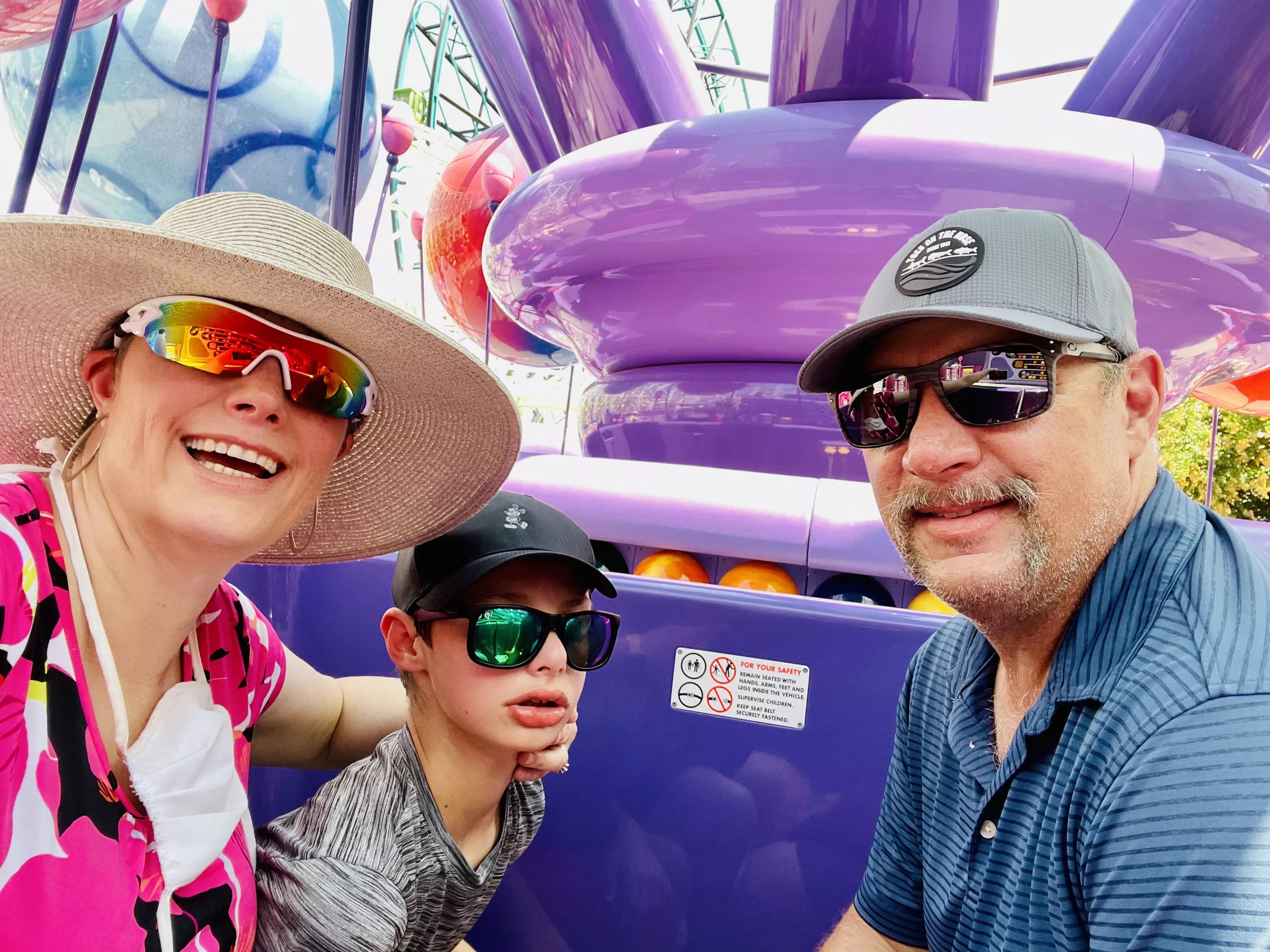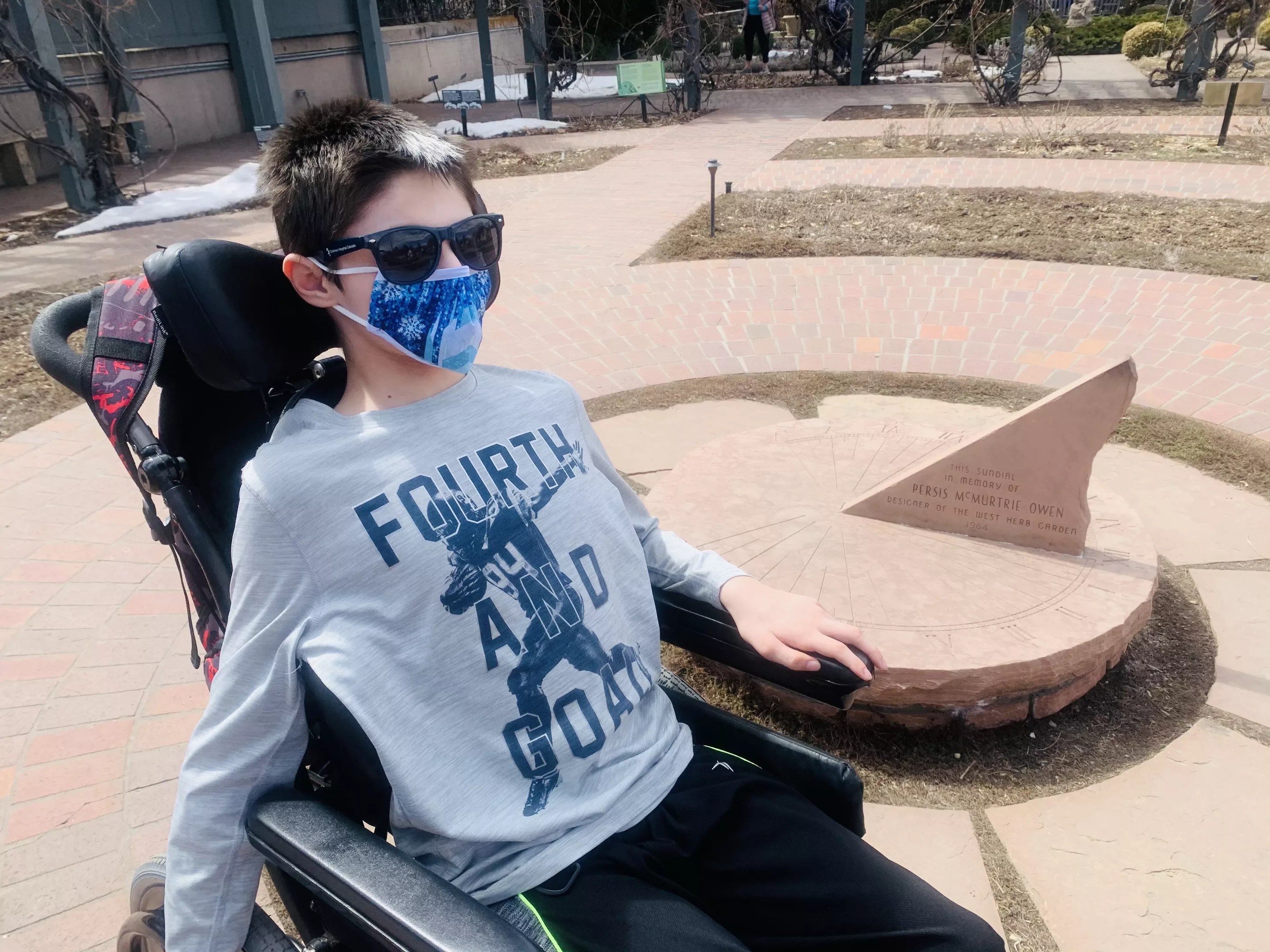
Courtesy Angela Wilson

Audio By Carbonatix
Like so many mothers, Angela Wilson struggles with convincing her child to ditch the screen and get outside.
The Thornton woman describes her son, Samuel, as a typical twelve-year-old, more interested in video games than outdoor activities, but she knows that having adventures in the real world will be beneficial in the end, even if he’d rather play with his iPad now. “You learn so much about yourself going places, seeing new things, experiencing new things,” Wilson says.
But because Samuel has intellectual and physical disabilities, finding new learning experiences for him proved difficult. Wilson had to figure out if a venue would not only interest her son, but accommodate him. For starters, was it wheelchair-accessible?
It often wasn’t easy getting the answer. “I was just kind of pissed that the information out there on the standard travel websites really didn’t exist,” Wilson recalls. “We were always forced to do extra research.”
While she was getting her MBA at Colorado State University in 2018, Wilson realized that she could put that research to good use. When students were tasked with creating a formal business plan for a new company, she thought about coming up with one involving accessibility. Although she went in another direction for that class, in January 2020 she decided it was time to create Exploryst, a website dedicated to providing information about adventuring in Colorado for people with disabilities – and doing so for free.
Since its launch in July 2020, Wilson has loaded the site with information gathered during her family’s experiences. Recent highlights include a rafting expedition through the National Sports Center for the Disabled and a Cañon City jeep tour with Colorado Jeep Tours; she’s detailed the fall activities that she and her family have enjoyed, including the seven-acre Corn Maze at the Botanic Gardens at Chatfield Farms, recommended accessible pumpkin patches, and shared ideas for indoor options, including the U.S. Olympic & Paralympic Museum in Colorado Springs and Meow Wolf.
Will you step up to support Westword this year?
We’re aiming to raise $50,000 by December 31, so we can continue covering what matters most to this community. If Westword matters to you, please take action and contribute today, so when news happens, our reporters can be there.

Samuel Wilson loves video games as much as any preteen, but his parents want him to get outside and into adventure.
Courtesy Angela Wilson
The site notes not just wheelchair accessibility, but information on other accommodations, such as captions on exhibits and American Sign Language translations.
Now, Wilson is going through a list of over 3,000 Colorado restaurants, venues and lodgings. She provides each business with a questionnaire regarding which accommodations it offers and hopes that when the owners see the list, they might add a few.
“It’s just not knowing,” Wilson says, explaining how she never cared about curb cuts before her son started using a wheelchair. “But the more you learn, the more you say, ‘Hey, there may be just minor adjustments that need to be made to be more inclusive of this population.'” Some places that don’t meet the gold standard of accessibility might still have possibilities, she notes.
Physical therapist Erica DeMarch, founder and CEO of Step and Connect, a Colorado-based company that offers educational and clinical services to promote balance in patients at risk for falls, concurs. Even spots that technically comply with the Americans With Disabilities Act might offer an inferior experience with blocked views or bar access to some elements of an adventure, she says; that’s why DeMarch is excited that Exploryst includes the Wilson family’s lived experience.
Step and Connect is one of Exploryst’s community partners, and the ventures help each other cross-promote and identify resources. DeMarch often works with people who have Parkinson’s disease, who sometimes stop doing activities they previously enjoyed, especially hiking, because they fear now being unprepared for the challenges. “The goal is to be able to go ahead and do the things that you love and be able to get out,” DeMarch says.
Sarah Thompson, founder and CEO of Rehabilitative Rhythms, an Exploryst community partner that aims to improve access to music therapy, says her nonprofit serves a few hundred families each week, and that most bring up the same concern: They want to do something but have no idea if it’s accessible or not. Exploryst has changed that.
According to the Centers for Disease Control, 20 percent of adults in Colorado have a disability; that percentage doesn’t include children.

Angela Wilson is forging a path toward a successful business that caters to people with disabilities wanting to explore Colorado.
Rachel Sorbet
As both a mother and a businesswoman, Wilson wanted to find a way to open up a market to this unserved population, a population that has strong brand loyalty. “If you treat my kid right, I will go out of my way to visit your location,” Wilson explains.”This is a population that is not actively pursued by the tourism and hospitality industry, but they have money to spend, they have friends and family who have money to spend, and you’re missing out by not getting your business in front of this population.”
Wilson recognizes that her family is fortunate. When Samuel needed around-the-clock care, she was able to stop working and provide that care because her husband had a stable job. That also gave her the opportunity to to explore various activities and share the experiences, helping other caregivers make plans.
“A lot of the caregivers in this community are already stretched thin and are trying to work and be a caregiver, or they’re caregiving for multiple people, or they have a lot of things going on, so to be able to say, ‘Just go to this site’ and point them to one location is so much easier than giving them suggestions and them having to weed through a few possibilities,” Thompson says.
For now, Exploryst is a one-woman show, with Wilson as the IT department, the marketing department and the accounting department rolled into one CEO. “I am busier than I’ve ever been,” she says. “I am more exhausted than I’ve ever been – but I’ve never been as fulfilled professionally.”
And while it might be a one-woman show, Exploryst already looks like a hit. Wilson was just recognized as part of the Forbes Next 1000, which identifies “entrepreneurs redefining the American dream.” She hopes that her work will inspire more people to recognize the importance of inclusivity, and that there will soon be a resource like Exploryst for every state.
“This is something that should have been built a long time ago,” she says. “I see TripAdvisor scratching their head saying, ‘Darn it, we missed out on this.'”